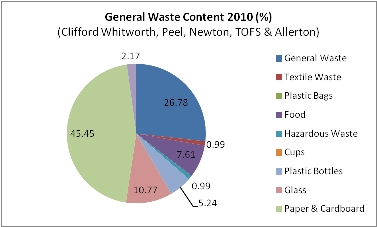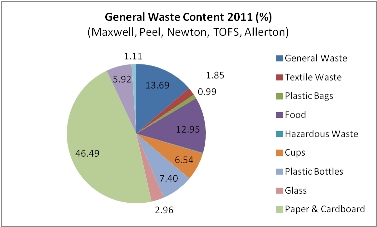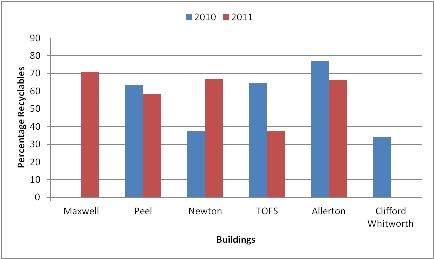The Environment and Sustainability Team have completed a number of audits of waste from buildings on campus.
The audits involve sorting the contents from all or a sample (at least 1 in 5) of black bags of general waste (waste being sent to landfill) removed from buildings. The waste is usually from a day and the audits were conducted during term time.
The graph below show the buildings which have been audited in 2010 and the content of their general waste. This highlights that the majority of material we have found in the waste being sent to landfill could be recycled using the University collection schemes.
It also shows that some hazardous items which are banned from landfill were found such as batteries, small printer cartridges and electrical items. These should be collected separately and sent to Estates and Property Services for disposal.
The graph below shows the findings for the general waste audits in 2011.
Overall the results have found that for most buildings, barring one, have reduced the amount of recyclables in their general waste from 2010 to 2011 (see below). TOFS has seen the greatest reduction from 64% of the general waste being recyclable in 2010 to 38% in 2011. Disappointingly Newton building saw an increase of 28% in recyclables in its general waste from 37% in 2010 to 66% in 2011.
A quick break down of the results shows that;
Maxwell: 71% of items in the general waste could have been recycled. Of this 70% was paper and cardboard. Maxwell did not take part in the waste audits in 2010.
Peel: Saw a reduction of 5% in the recyclables in its general waste although over half of its content could have been recycled (58%). 55% of this was paper and cardboard and 34% was plastic bottles.
Newton: Saw a rise of 30% more recyclables in its general waste compared to last year. 73% of this was paper and cardboard. There was also some hazardous waste from a toner cartridge.
TOFS: Saw a reduction of 27% of recyclables in its general waste and it should be noted that there was already a separation of paper into recycling bags. That said 47% of the recyclable content of the general waste was paper and cardboard. The majority of the waste was food (52%), suggesting that the closeness of Maxwell composter should be utilised.
Allerton: Saw a reduction of 11% of recyclables in its general waste. The majority of this (78%) was paper and cardboard. It should be noted that there were some recycling bags from Allerton however the majority were contaminated.


